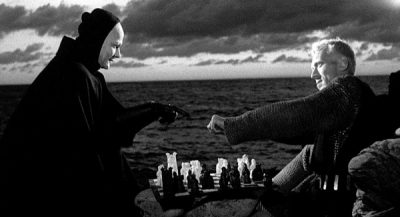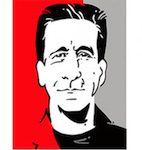By
Robert Kilborn
And there was war in heaven: Michael
and his angels fought against the dragon.
And the great dragon was cast out, that
old serpent, called the Devil, and Satan,
which deceiveth the whole world.
—Revelation 12: 7-9
The Festival International de Jazz de Montréal swoons into its downbeat. Like Easter Island monoliths, numinous and colossal holograms of Billie Holiday, Oscar Peterson, and Charlie Parker facade and sanctify entire city blocks. From rue Crescent to boulevard Saint-Laurent, tens of thousands cascade into the world’s largest jazz event, a Niagara of five million ears at 650 concerts in 10 days. Hipsters figged out in Ray-Bans, goatees, and panama hats hug the city’s bars, restaurants, and outdoor cafés. At every street corner, a saxophonist, guitarist, singer or spoons virtuoso riffs on the warm June air. Sitting alone in a terrasse near the gates of McGill University, I scrutinize a red and black publicity poster taped to the café window: a surreal image of Miles Davis and his trumpet floating above the esplanade of Place des Arts, hundreds of eyes gazing up, ears following the notes. At the next table I see a girl in a white camisole scratch her lips on her boyfriend’s first beard. The boy strokes her milky shoulders. The girl sees me, smiles radiantly, and offers me her bowl of wild strawberries. I smile back and raise a hand in polite refusal. But she insists, and I accept, “Just one.”
Many years ago, in this same terrasse, I was another girl’s boyfriend, stroking her creamy shoulders sheathed in a white camisole. I felt her lips scratch my first beard. I devoured her wild strawberries. Years now pass like ships whose wakes foam and thrill and subside into forgetfulness and oblivion. Now I watch youth rise in waves that, after an instant, vanish, a trick of the clock.
“But thy eternal summer shall not fade.”
In the 21st century, we finally know for certain that our destiny is annihilation, an explosion of stars. This line from Shakespeare’s 18th sonnet is all we have. We have only these wild strawberries, this kiss and this first beard, these white shoulders flowering like lilies from a white camisole. As I watch their faces ashen in the dusk, I marvel at this young couple’s innocence and happiness. I want to protect them from the implacable world. I want to remember their words and faces, this hour of peace, the wild strawberries, forever.
In the evening, after a smoked meat sandwich at Schwartz’s, I wander, almost by chance, into the Cinéma du Parc. I watch the Ingmar Bergman classic The Seventh Seal, in which the disillusioned medieval knight Antonius Block returns home to Sweden from the horror of the Crusades to the agony of the Black Death. Universal suffering, mass death and sadomasochistic hysteria govern the land. Innocents burn at the stake. Scholars of theology rob corpses and rape servant girls. Neither youth nor beauty nor wisdom survives. Block searches vainly for answers, for God. He plays chess with the ashen-faced, black-cloaked figure of Death, who may also be God, or the Devil, or a mere priest, or mere nothingness, mere absence, the terrifying void. He admits to Death that his life has been futile and without meaning, but that before he dies he wants to perform “one meaningful deed.”
Soon after, by their horse-drawn wagon in a meadow, Block encounters a young wandering minstrel couple, Mary and Joseph, and their year-old child Mikael. Bergman wants us to think of Mary and Joseph, the parents of Christ. He also wants us to think of Michael the Archangel, who, at the end of time in the Book of Revelation, leads God’s armies against Satan’s forces, defeating sin, evil, and death. (The earlier Protestant scholars usually identified Michael with the preincarnate Christ, finding support for their view, not only in the juxtaposition of the “child” and the archangel in Revelation 12:1-17, but also in the attributes ascribed to him in Daniel.) Block marvels at this little family’s innocence and happiness. A radiantly angelic Mary kindly entreats Block to join them as they eat wild strawberries and drink fresh milk. The knight accepts this brief communion of life in death, loses some of his solemnity, savours the welcome food, and says, “I shall remember this hour of peace: the strawberries, the bowl of milk, your faces in the dusk. I shall remember our words, and shall bear this memory between my hands as carefully as a bowl of fresh milk.”
Block then resumes his futile game of chess with all-pursuing Death. But this time he cleverly distracts Death for a moment by knocking over the chess pieces, enabling Mary, Joseph and their little son Mikael to escape. But the protective Knight, who has at last performed his “one meaningful deed,” and, perhaps, finally understood his life’s meaning, does not escape.



No Comments Yet!
You can be first to comment this post!